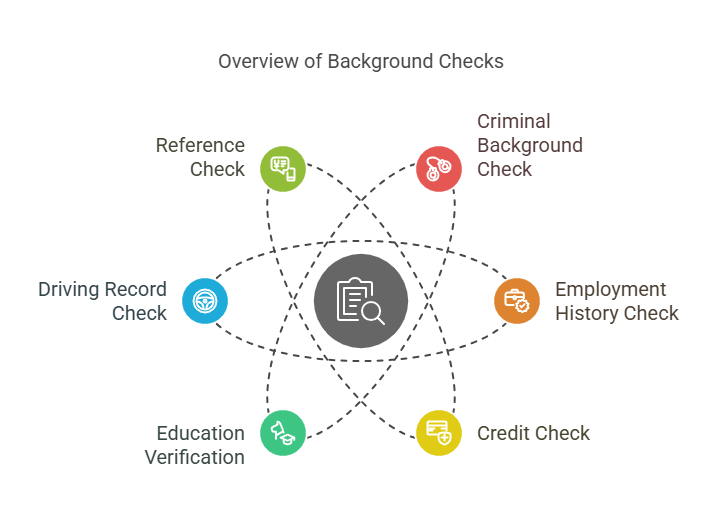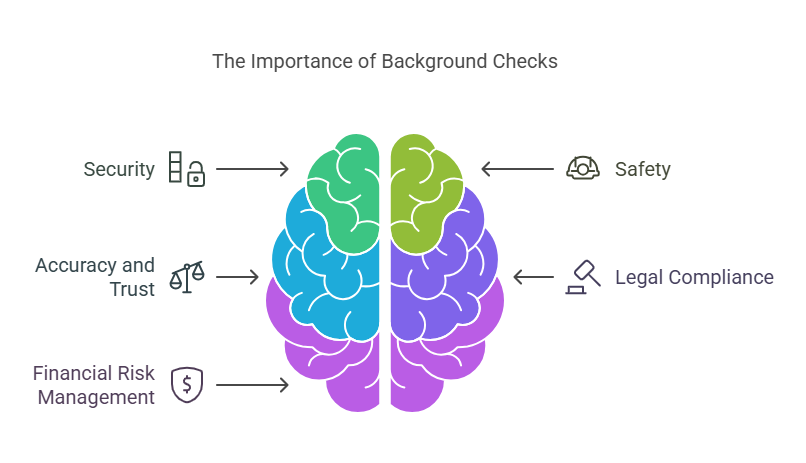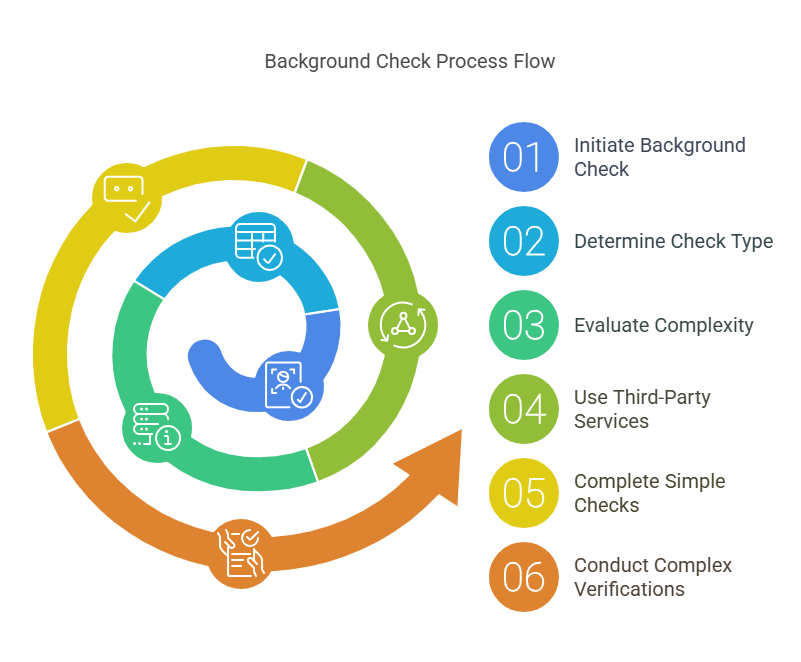How to Obtain a Background Check Report

What is a Background Check Report?
A background check report is a comprehensive document used to verify the personal, professional, and legal history of an individual. These reports are commonly used by employers, landlords, educational institutions, and other entities to assess the suitability of a candidate for a position, rental, or service. The primary goal of a background check is to ensure that the individual meets certain criteria, such as a clean criminal record, verified education, and consistent employment history, which may be essential for the role or relationship in question.
In today’s world, where security and trust are paramount, background checks serve as a vital tool in protecting businesses, property owners, and institutions from potential risks. Whether it’s a hiring manager ensuring a candidate’s qualifications or a landlord assessing a potential tenant, background check reports help decision-makers identify key insights and potential red flags.
Common Types of Background Checks

Various types of background checks are conducted depending on the purpose of the report and the nature of the relationship between the individual and the requesting entity. Below are the most common types of background checks:
- Criminal Background Check: One of the most common types, used to identify any criminal records that may exist, including felonies, misdemeanors, and arrests.
- Employment History Check: Employers use this check to verify an individual’s work history, including past employers, job titles, dates of employment, and reasons for leaving.
- Credit Check: Commonly used by landlords, banks, and lenders, this check evaluates an individual’s creditworthiness, including their debt levels, payment history, and overall financial stability.
- Education Verification: This check confirms the educational qualifications of an individual, including the degree obtained, the institution attended, and the dates of attendance.
- Driving Record Check: Relevant in jobs where driving is part of the role, this check verifies an individual’s driving history, including violations, accidents, and any driving-related offenses.
- Reference Check: Employers may reach out to provided references to verify the applicant’s character, work ethic, and performance in previous roles.
Each of these checks aims to provide a thorough overview of a candidate’s background and is typically tailored to the specific needs of the requesting party.
What Information is Typically Included in a Background Check Report?
A background check report typically includes a mix of personal, professional, and legal data. The information provided depends on the type of check performed and the level of detail requested. Here is a general overview of the sections that may appear in a background check report:
- Personal Information: This includes full name, aliases, date of birth, and social security number.
- Criminal History: This section may list any felony or misdemeanor charges, convictions, or pending charges.
- Employment History: Information about previous jobs, including employer names, job titles, dates of employment, and reasons for leaving.
- Education Verification: Confirmation of degrees, certifications, and institutions attended.
- Credit Report: A detailed analysis of financial history, including credit scores, outstanding debts, bankruptcies, and payment history.
- Driving Record: A report on traffic violations, accidents, and DUI offenses.
- Civil Records: This may include lawsuits, judgments, and bankruptcies.
- Reference Checks: Notes or feedback from previous employers or personal references.
The details provided in a background check report play a crucial role in helping employers, landlords, and others make informed decisions.
Why Background Checks Are Important

Background checks are essential for various sectors, including employment, renting, and security clearance. Here are some reasons why they are important:
- Security: Employers use background checks to reduce the risk of hiring individuals with criminal histories that may pose a threat to other employees or clients.
- Safety: In fields that require safety-sensitive roles, like healthcare or transportation, background checks ensure that candidates do not have a history of reckless behavior or drug use.
- Accuracy and Trust: Background checks help verify the information provided by applicants, ensuring that potential employees or tenants are honest and trustworthy.
- Legal Compliance: Certain industries, such as financial services, may require background checks for regulatory compliance, ensuring that employees meet specific legal standards.
- Financial Risk Management: For lenders or landlords, conducting credit and background checks helps minimize financial risks by ensuring that tenants or borrowers are financially stable and reliable.
As such, a background check report serves as an essential tool for reducing uncertainty and enhancing trust in decision-making processes.
Sections of a Typical Background Check Report
A standard background check report is structured to provide clear, concise, and relevant information. Below is a breakdown of the key sections that can be found in a typical report:
1. Criminal Records
This section details any felony or misdemeanor convictions, arrests, pending charges, or criminal activity. It may also include information about the status of cases and the jurisdictions where the charges were filed.
- Types of Criminal Records:
- Felony convictions
- Misdemeanors
- Arrests
- Pending cases
- Warrants
2. Employment History
Employers will use this section to verify the applicant’s past job titles, companies worked for, and the dates of employment. This section may also include any discrepancies or gaps in employment history.
- Key Information:
- Previous employers
- Job titles
- Dates of employment
- Reasons for leaving
3. Educational Background
The educational verification section confirms an individual’s highest levels of education, including degrees earned and institutions attended. It may also include certification checks and the authenticity of diplomas or courses completed.
- Key Information:
- Degree obtained
- Institutions attended
- Graduation dates
4. Credit History
Credit checks are often included in background reports to evaluate an individual’s financial responsibility. This section provides details about credit scores, outstanding debts, bankruptcies, or collections.
- Key Information:
- Credit score
- Outstanding debts
- Bankruptcy filings
- Foreclosures
5. Driving Records
For jobs that involve driving, a driving record check will provide information about an applicant’s driving history, including any violations, accidents, or suspensions.
- Key Information:
- Traffic violations
- Accidents
- DUI or DWI offenses
6. Civil Records
Civil records can reveal lawsuits or judgments against an individual. This section may also include bankruptcies or any non-criminal legal issues that might influence decision-making.
- Key Information:
- Civil lawsuits
- Judgments
- Bankruptcies
How Background Check Reports Are Processed and How Long They Take

The background check process can vary depending on the depth of the investigation and the types of checks being conducted. Generally, a standard background check can take anywhere from 1-7 business days. The following factors influence how long the process may take:
- Test and Verification Methods: Urgent tests or simple checks like credit reports may take less time, while educational verification or criminal records may require more time, particularly if records need to be obtained from multiple jurisdictions.
- The Complexity of the Information: If a background check involves multiple checks or needs to confirm specific details (like past employment or legal cases), the process can take longer.
- Third-Party Services: Using third-party services like Exact Background Checks can expedite the process as they rely on established networks for quick access to accurate information.
Different Types of Background Checks
| Check Type | Information Included |
|---|---|
| Criminal Background Check | Felony convictions, arrests, misdemeanors, pending charges |
| Employment History Check | Employer names, job titles, dates of employment |
| Credit Check | Credit score, debts, bankruptcies, payment history |
| Education Verification | Degrees, certifications, institutions attended |
| Driving Record Check | Traffic violations, DUI, accidents |
| Civil Record Check | Lawsuits, judgments, bankruptcies |
Exact Background Checks Services
Exact Background Checks specializes in providing accurate, timely, and comprehensive background check reports. By utilizing a network of trusted data sources, we ensure employers and organizations can make informed decisions based on reliable, up-to-date information.
Legal Aspects of Background Checks
1. Employers’ Rights and Applicants’ Rights
While employers are legally permitted to run background checks, there are strict rules governing how they can use the information. For example, an employer cannot make employment decisions based solely on certain records, such as arrests that did not result in a conviction.
2. Fair Credit Reporting Act (FCRA)
The FCRA is a critical piece of legislation that regulates how background checks can be conducted. Under the FCRA:
- Employers must obtain written consent from the applicant before conducting a background check.
- Employers must notify applicants if they plan to take adverse action (e.g., not hiring or renting) based on the results of the background check.
- Applicants are entitled to receive a copy of the report and dispute any inaccuracies.
FAQs: Common Questions About Background Check Reports
What types of information are typically included in a background check report?
A background check report typically includes:
- Criminal History: Felonies, misdemeanors, arrests.
- Employment History: Past employers, job titles, dates of employment.
- Education Verification: Degrees, certifications, institutions attended.
- Credit Report: Credit scores, debts, bankruptcies.
- Driving Record: Traffic violations, accidents, DUI.
- Civil Records: Lawsuits, judgments, bankruptcies.
- Personal Information: Full name, aliases, date of birth, SSN.
Why are background checks important for employers, landlords, and other entities?
Background checks are important for:
- Security: Reducing the risk of hiring or renting to potentially dangerous individuals.
- Safety: Ensuring safety-sensitive roles are filled by qualified, reliable people.
- Accuracy and Trust: Verifying information and ensuring honesty.
- Legal Compliance: Meeting regulatory requirements in certain industries.
- Financial Risk Management: Assessing creditworthiness and reliability for financial transactions.
How long does a typical background check report take to process, and what factors influence the timeline?
A typical background check can take 1-7 business days. Factors influencing the timeline include:
- Test and verification methods.
- Complexity of the information.
- Use of third-party services like Exact Background Checks.
What legal aspects govern background checks, and what are an applicant's rights?
Legal aspects include:
- Employers' Rights and Applicants' Rights: Employers can run checks but must follow legal guidelines.
- Fair Credit Reporting Act (FCRA): Requires written consent, notification of adverse actions, and allows applicants to dispute inaccuracies.
What are the different types of background checks, and what information does each provide?
Types include:
- Criminal Background Check: Criminal records.
- Employment History Check: Job history.
- Credit Check: Financial history.
- Education Verification: Educational qualifications.
- Driving Record Check: Driving history.
- Civil Record Check: Civil legal history.
Each type provides specific information relevant to the purpose of the check.
What types of information are typically included in a background check report?
A background check report typically includes:
- Criminal History: Felonies, misdemeanors, arrests.
- Employment History: Past employers, job titles, dates of employment.
- Education Verification: Degrees, certifications, institutions attended.
- Credit Report: Credit scores, debts, bankruptcies.
- Driving Record: Traffic violations, accidents, DUI.
- Civil Records: Lawsuits, judgments, bankruptcies.
- Personal Information: Full name, aliases, date of birth, SSN.
Why are background checks important for employers, landlords, and other entities?
Background checks are important for:
- Security: Reducing the risk of hiring or renting to potentially dangerous individuals.
- Safety: Ensuring safety-sensitive roles are filled by qualified, reliable people.
- Accuracy and Trust: Verifying information and ensuring honesty.
- Legal Compliance: Meeting regulatory requirements in certain industries.
- Financial Risk Management: Assessing creditworthiness and reliability for financial transactions.
How long does a typical background check report take to process, and what factors influence the timeline?
A typical background check can take 1-7 business days. Factors influencing the timeline include:
- Test and verification methods.
- Complexity of the information.
- Use of third-party services like Exact Background Checks.
What legal aspects govern background checks, and what are an applicant's rights?
Legal aspects include:
- Employers' Rights and Applicants' Rights: Employers can run checks but must follow legal guidelines.
- Fair Credit Reporting Act (FCRA): Requires written consent, notification of adverse actions, and allows applicants to dispute inaccuracies.
What are the different types of background checks, and what information does each provide?
Types include:
- Criminal Background Check: Criminal records.
- Employment History Check: Job history.
- Credit Check: Financial history.
- Education Verification: Educational qualifications.
- Driving Record Check: Driving history.
- Civil Record Check: Civil legal history.
Each type provides specific information relevant to the purpose of the check.
Conclusion
Understanding background check reports is essential for anyone involved in the hiring, renting, or leasing process. These reports offer critical insights into an individual’s history and suitability for specific roles or responsibilities. By staying informed about the types of checks, legal considerations, and your rights, you can navigate the process more effectively.
For employers and organizations, it’s vital to use a trusted service like Exact Background Checks to ensure you receive accurate, comprehensive reports that comply with legal requirements.



